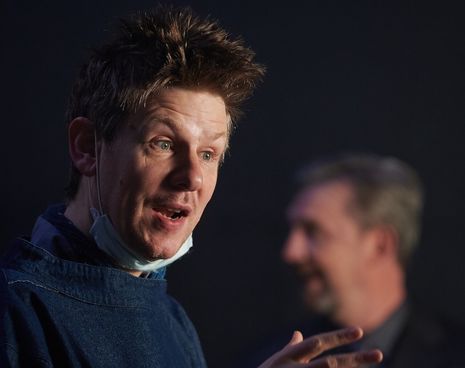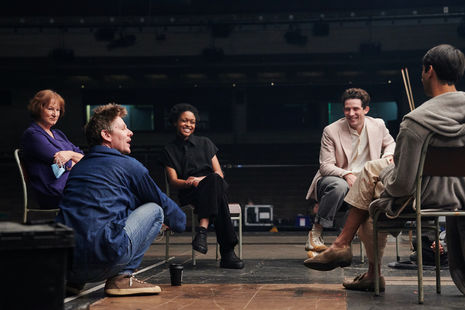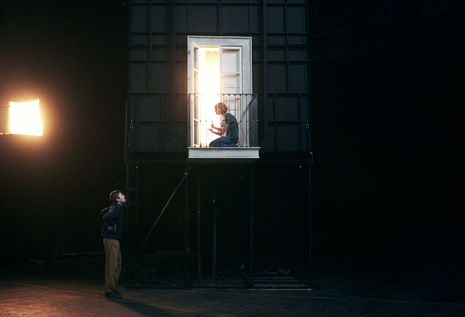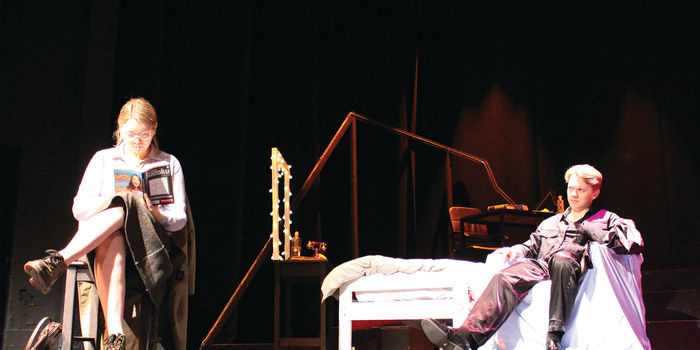Simon Godwin: “We need Shakespeare to really roar back out of the box to justify us coming back to him”
Tilly Palmer speaks to Simon Godwin, Artistic Director of the Shakespeare Theatre Company, about Shakespeare in Cambridge, keeping his plays alive and the future of post-pandemic theatre

Simon Godwin has just finished directing a film adaptation of Romeo and Juliet, filmed during lockdown. He directed the very same play with the Marlowe Society some years earlier, having just graduated from Cambridge, with undergraduates Tom Hiddleston as Romeo and Lydia Fox as Juliet. He tells me his vision for that performance was Fellini-esque “filled with a sort of promise and optimism”. As Godwin explains, “we know that Shakespeare in Hamlet describes his work as being a ‘Mirror’ to the form and pressures of the age”. Perhaps this also reflected the promise and optimism of being a student standing at a threshold, about to embark on an exciting career path.
Godwin’s 2021 version of Romeo and Juliet starring Josh O’Connor and Jessie Buckley mirrors the constraints of its creation during the pandemic. The use of a cameraman with the viewpoint of a cast member brings audiences in much closer proximity to the action; the play privileges human closeness and touch. “I originally had conceived of a production that was for the stage and had a kind of fluidity and swiftness. But the particular conditions of the film that we were making; inside a shuttered theatre and very much trying to draw an aesthetic that was influenced by the feelings of disorientation of the many different levels of reality that we were all occupying during the pandemic.”
During his time as an English undergraduate at St Catherine’s College, Godwin directed Shakespeare tours of plays like Hamlet and The Winter’s Tale to America and Russia. “You do plays at Cambridge outside of the syllabus, you’re not taught how to do plays, you just find out how to do plays, and it brings a great deal of initiative and collaboration which are of course two central tenets of later creative work.”

We talk about how often Shakespeare is recycled and the benefits and drawbacks of this. Godwin is now Artistic Director of the Shakespeare Theatre Company in Washington, having previously been Associate Director at the National Theatre, worked with The Royal Court Theatre, Bristol Old Vic and has enjoyed a long relationship with the Royal Shakespeare Company. It seems that internationalism is a key feature of his career and approach to Shakespeare. I tell him that the English set text for this year is Antony and Cleopatra, which he directed with Ralph Fiennes and Sophie Okonedo. He travels to the play’s setting for inspiration, even if Shakespeare had never been there - Egypt for Antony and Cleopatra and Ghana for a new lens on Hamlet - but despite this he never strays too far from his university stomping ground. “When I do Shakespeare, pretty much the first place I come back to is Cambridge. And I came back to St Catherines, where I was an undergraduate, and I talked to my Director of Studies Dr Paul Hartle about the play. And Dr Hester Lees-Jeffries and Dr Caroline Gonda. These three academics at the college remain my touchstone, my guiding spirit. And I find those dialogues incredibly helpful and enriching and so I think as a director the aesthetics and the textual analysis go hand in hand.”
“When I do Shakespeare, pretty much the first place I come back to is Cambridge”
I ask him if he ever feels pressured to uphold the tradition of Shakespeare, or if contemporary audiences burden him with constantly trying to adapt his plays to modern attitudes. He replies “I tend not to use words like tradition or upholding, because I think these are all things that can get in the way of your aim. Which in my case, the aim is to make something energising, entertaining, nuanced, joyous, moving.” “I think that Shakespeare himself was very much a writer committed to his own present, very much committed to new writing, very much committed to modernity and contemporaneousness. We know his plays were performed in modern dress for example; he was always looking to capture the popular audience of his moment. So I think we do Shakespeare best when we follow a similar set of principles; that he needs to be entertaining, and alive and audacious and irreverent. And I don’t think my personal aim is to be in any way scholastic, or reverential.”

Shakespeare constantly attracts big names and Godwin has worked with both stage and screen actors. “I’ve really enjoyed working with actors that have a huge amount of experience in Shakespeare, for example Ralph Fiennes and Tamsin Greig, who are always extraordinarily well prepared, who understand the structure of Shakespeare but also they understand how to be very playful over it.” We discuss how the medium of film can change the way audiences, specifically younger audiences, can access Shakespeare. “What was exciting about Romeo and Juliet was finally reaching a really popular audience, through film, and I’m looking forward to thinking of ways I can now direct Shakespeare in an even more entertaining form and that will appeal to a broad cross-section of people. After lockdown, I think we need Shakespeare to really roar back out of the box to justify us coming back to him as we do, again and again.”
“They’ll probably want to revel in the corporality or the viscerality of theatre as a shared event with bodies and all of us together in the dark”
Godwin’s prediction for this ‘roar’ filters through the privileging of touch and human closeness in Romeo and Juliet, but moving back to theatre from film will expound this to a larger degree. Does he think that the absence of theatre for so long will have any lasting effects? “I think as theatre comes back, people will probably want to do things that are very theatrical. They’ll probably want to revel in the corporality or the viscerality of theatre as a shared event with bodies and all of us together in the dark.”
When Godwin talks about Shakespeare, his vibrancy and the spirit of his writing is communicated with such bounce and excitement. His appreciation for Shakespeare at university is infectious: “Shakespeare as a collective voice, as a collective ritual, as an act of solidarity with others is absolutely right and I’m glad that you’re going to get the chance to see him in that light again.”
Godwin ends with some advice for current Cambridge students. “Enjoy and care for the experiences that you are having now because these are the seeds that will flourish over the decades to come.”
Maybe Shakespeare this term is just what the doctor ordered.
 News / Cambridge bus strikes continue into new year16 January 2026
News / Cambridge bus strikes continue into new year16 January 2026 News / Uni members slam ‘totalitarian’ recommendation to stop vet course 15 January 2026
News / Uni members slam ‘totalitarian’ recommendation to stop vet course 15 January 2026 Science / Why smart students keep failing to quit smoking15 January 2026
Science / Why smart students keep failing to quit smoking15 January 2026 Interviews / The Cambridge Cupid: what’s the secret to a great date?14 January 2026
Interviews / The Cambridge Cupid: what’s the secret to a great date?14 January 2026 News / Local business in trademark battle with Uni over use of ‘Cambridge’17 January 2026
News / Local business in trademark battle with Uni over use of ‘Cambridge’17 January 2026










